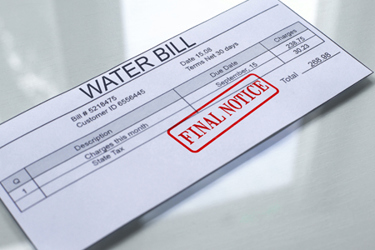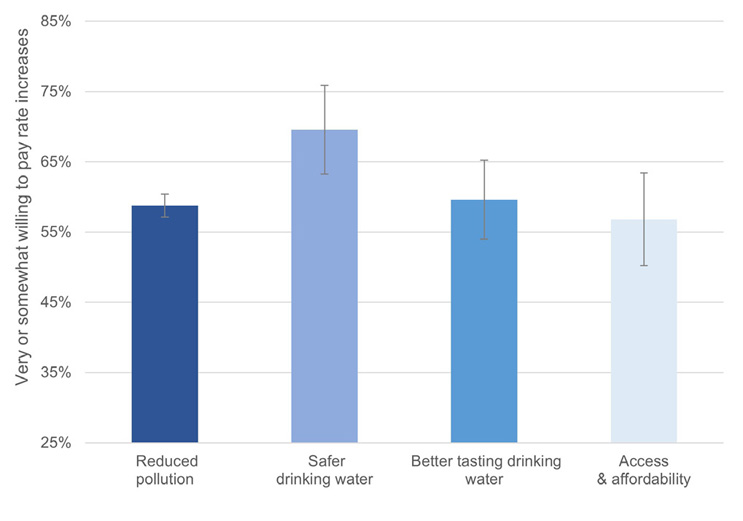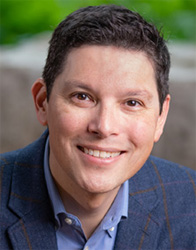The Frame Game: The Science Of Talking About Water Rate Increases
By Manny Teodoro

What is the benefit of a water rate increase? Providing the right answer could determine the public’s willingness to pay more.
Strictly from a value standpoint, it’s hard to imagine anything that provides more bang for the buck than well-built and properly managed water and sewer utilities. But the public doesn’t always see the value of these utilities, largely because they don’t see those systems at all. Water infrastructure investments — and the rate increases that they require — demand political consideration as well as economic calculations. Winning voter support for the investment is as important as designing an efficient system.
Despite widespread and growing efforts at communicating the value of water, little systematic evidence exists on how best to do so. Water and sewer utilities provide many benefits, including a cleaner environment, fire suppression, economic prosperity, safe drinking water, irrigation, and more. All of those benefits are important, but we know from cognitive psychology that people can’t contemplate them all at the same time and don’t think about them all in the same way. Which benefits really matter when people think about the value of water?
The Frame Game
How you talk about an issue can shape how people think about it. Public opinion and consumer behavior researchers call that framing: the strategic use of language to communicate ideas in ways that encourage certain interpretations and discourage others. Aware of the power of framing, politicians carefully evaluate the ways that they talk about issues precisely because they know that the words they use will shape how the public perceives them.
If customers think about water services the same way that they think about other goods, and if voters think about water rates the same way they think about other political issues, then we ought to expect framing to affect public perceptions of the value of water.
The Science Of Water Comms
Taking a scientific approach to the value-of-water appeal, I worked with the U.S. Water Alliance in 2021 to include an experiment in their Value of Water Survey (VOWS) — an annual public opinion poll that surveys about a thousand U.S. voters on their attitudes toward water and sewer infrastructure. Among other questions we asked about the prospect of a rate increase:
Suppose your water, wastewater, and stormwater service provider increased rates by a modest amount to ____________. Would you be willing or unwilling to pay this rate increase?*
We then finished that first sentence by randomly assigning one of four benefits that would be associated with the rate increase:
…reduce pollution and make local streams and rivers cleaner.
…make your area’s drinking water safer and healthier.
…make your area’s drinking water taste and smell better.
…ensure that everyone in your community has basic water and sewer service, and to prevent shutoffs for non-payment.

We were interested in whether different benefits would elicit different levels of willingness to pay a rate increase. This is a pretty standard framing experiment — a widely used method in public opinion research. The question asks about the same subject (in this case, a water/sewer rate increase), but randomly changes the information provided about the subject (in this case, the potential benefits of a rate increase). Randomized framing experiments are popular and powerful because they can demonstrate with high confidence which messaging strategies are most and least effective.
A Clear Winner
The VOWS garnered responses from about a thousand registered U.S. voters in March 2021, and those voters gave us a clear winner: The safer drinking water treatment generated markedly greater willingness to pay compared with the other three frames.

Compared with the other treatments, the safer drinking water framing yielded a remarkable 11.2% greater average willingness to pay a rate increase. Reducing pollution, improved aesthetics, and access/affordability are all good things, but voters responded much more positively to the prospect of safer drinking water than to any of the other benefits put before them.
Implications For Messaging
That drinking water safety resonates strongly with voters isn’t terribly surprising. The more useful and noteworthy finding here is that other benefits we tested are markedly less effective in evoking support for rate increases.** The 2021 VOWS experiment shows that emphasizing safe, healthy drinking water can be more effective in winning support for rate increases than messages about pollution, aesthetics, or affordability.
Decades of psychological research show that there are cognitive limits on the messages that people receive and process; that’s why smart communicators keep messages simple and focused. Efforts to persuade customers about the value of water should likewise focus on a limited range of benefits. This study gives us good reasons to expect that messages accentuating safe drinking water will be the most effective in making the case for a rate increase.
You can read more about the VOWS framing experiment in this paper, published in AWWA Water Science.
* Respondents could answer on a four-point scale: very willing, somewhat willing, somewhat unwilling, or very unwilling. For simplicity’s sake, the analysis here recodes these responses as binary (willing/unwilling). Analysis of the same data as continuous or ordinal yields consistent results.
** Future studies might test the effects of framing rate increases in terms of fire protection, sustainability, irrigation, economic growth, flood control, and other benefits associated with water and sewer utilities.
About The Author
 Manny Teodoro is the Robert & Sylvia Wagner Professor at the La Follette School of Public Affairs at the University of Wisconsin-Madison. His research focuses on U.S. environmental policy and implementation. His latest book, The Profits Of Distrust (2022, Cambridge) links the meteoric rise of the bottled water industry to declining trust in American democracy. Teodoro also pursues a line of applied research on utility management, policy, and finance, working directly with sector leaders across the U.S. to address policy problems. For more of Teodoro’s work on water policy, finance, and management, see https://mannyteodoro.com.
Manny Teodoro is the Robert & Sylvia Wagner Professor at the La Follette School of Public Affairs at the University of Wisconsin-Madison. His research focuses on U.S. environmental policy and implementation. His latest book, The Profits Of Distrust (2022, Cambridge) links the meteoric rise of the bottled water industry to declining trust in American democracy. Teodoro also pursues a line of applied research on utility management, policy, and finance, working directly with sector leaders across the U.S. to address policy problems. For more of Teodoro’s work on water policy, finance, and management, see https://mannyteodoro.com.
